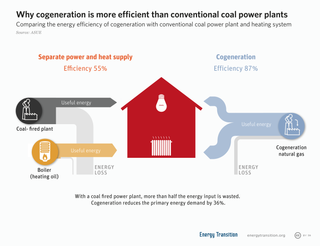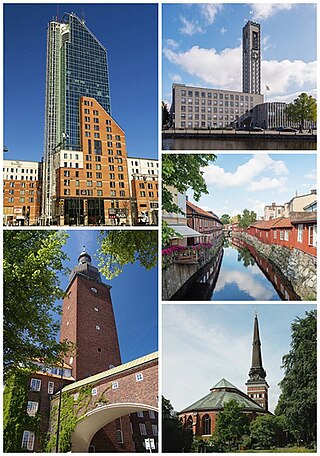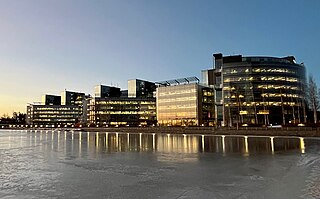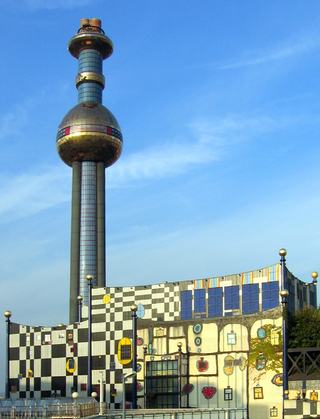
Energy development is the field of activities focused on obtaining sources of energy from natural resources. These activities include the production of renewable, nuclear, and fossil fuel derived sources of energy, and for the recovery and reuse of energy that would otherwise be wasted. Energy conservation and efficiency measures reduce the demand for energy development, and can have benefits to society with improvements to environmental issues.

Cogeneration or combined heat and power (CHP) is the use of a heat engine or power station to generate electricity and useful heat at the same time.

Västerås is a city in central Sweden on the shore of Lake Mälaren in the province of Västmanland, 100 kilometres west of Stockholm. The city had a population of 127,799 at the end of 2019, out of the municipal total of 158,653, over 100,000 more than the next largest of the 17 localities included in the Västerås Municipality. Västerås is the seat of Västerås Municipality, which is the capital of Västmanland County and an episcopal see.

Fortum Oyj is a Finnish state-owned energy company located in Espoo, Finland. It mainly focuses on the Nordic region. Fortum operates power plants, including co-generation plants, and generates and sells electricity and heat. The company also sells waste services such as recycling, reutilisation, final disposal solutions and soil remediation and environmental constructions services, and other energy-related services and products e.g. consultancy services for power plants and electric vehicle charging. Fortum is listed on the Nasdaq Helsinki stock exchange.

District heating is a system for distributing heat generated in a centralized location through a system of insulated pipes for residential and commercial heating requirements such as space heating and water heating. The heat is often obtained from a cogeneration plant burning fossil fuels or biomass, but heat-only boiler stations, geothermal heating, heat pumps and central solar heating are also used, as well as heat waste from factories and nuclear power electricity generation. District heating plants can provide higher efficiencies and better pollution control than localized boilers. According to some research, district heating with combined heat and power (CHPDH) is the cheapest method of cutting carbon emissions, and has one of the lowest carbon footprints of all fossil generation plants.

Statkraft AS is a hydropower company, fully owned by the Norwegian state. The Statkraft Group is Europe's largest generator of renewable energy, as well as Norway’s largest and the Nordic region's third largest energy producer. Statkraft develops and generates hydropower, wind power, gas power, district heating and solar power. It is also a player in the international energy markets. The company has 5,300 employees in 21 countries with their headquarters located in Oslo, Norway.

Energy in Bulgaria is among the most important sectors of the national economy and encompasses energy and electricity production, consumption and transportation in Bulgaria. The national energy policy is implemented by the National Assembly and the Government of Bulgaria, conducted by the Ministry of Energy and regulated by the Energy and Water Regulatory Commission. The completely state-owned company Bulgarian Energy Holding owns subsidiaries operating in different energy sectors, including electricity: Kozloduy Nuclear Power Plant, Maritsa Iztok 2 Thermal Power Plant, NEK EAD and Elektroenergien sistemen operator (ESO); natural gas: Bulgargaz and Bulgartransgaz; coal mining: Maritsa Iztok Mines. In Bulgaria, energy prices for households are state-controlled, while commercial electricity prices are determined by the market.

Denmark has considerable sources of oil and natural gas in the North Sea and ranked as number 32 in the world among net exporters of crude oil in 2008. Denmark expects to be self-sufficient with oil until 2050. However, gas resources are expected to decline, and production may decline below consumption in 2020, making imports necessary. Denmark imports around 12% of its energy.

Hrvatska elektroprivreda is a national power company in Croatia which has been engaged in electricity production, transmission and distribution for more than one century, and with heat supply and gas distribution for the past few decades. HEP Group is organized in the form of a holding company with a number of daughter companies.

Abengoa, S.A. was a Spanish multinational company in the green infrastructure, energy and water sectors. The company was founded in 1941 by Javier Benjumea Puigcerver and José Manuel Abaurre Fernández-Pasalagua, and was based in Seville, Spain. Its current chairman is Gonzalo Urquijo Fernández de Araoz. After repeated bankruptcies and rescues, it declared insolvency in February 2021 amid various regulatory and financial charges against the board and management, the second-largest corporate collapse in Spanish history.

Biofuels are renewable fuels that are produced by living organisms (biomass). Biofuels can be solid, gaseous or liquid, which comes in two forms: ethanol and biodiesel and often replace fossil fuels. Many countries now use biofuels as energy sources, including Sweden. Sweden has one of the highest usages of biofuel in all of Europe, at 32%, primarily due to the widespread commitment to E85, bioheating and bioelectricity.

Renewable energy in Finland increased from 34% of the total final energy consumption (TFEC) in 2011 to 48% by the end of 2021, primarily driven by bioenergy (38%), hydroelectric power (6.1%), and wind energy (3.3%). In 2021, renewables covered 53% of heating and cooling, 39% of electricity generation, and 20% of the transport sector. By 2020, this growth positioned Finland as having the third highest share of renewables in TFEC among International Energy Agency (IEA) member countries.
Fennovoima Ltd is a nuclear power company established by Russian state's nuclear company Rosatom and a consortium of Finnish state-owned power and industrial companies.

Ormat Technologies, Inc. is an international company based in Reno, Nevada, United States. Ormat supplies alternative and renewable geothermal energy technology. The company has built over 190 power plants and installed over 3,200 MW. As of January 2021 it owns and operates 933 MW of geothermal and recovered energy based power plants. Ormat has supplied over 1000 turbochargers worldwide: North America, South America, Europe, Australia, and Asia. The company's products also include turbines, generators, and heat exchangers.

Energy in Sweden is characterized by relatively high per capita production and consumption, and a reliance on imports for fossil fuel supplies.

Energy in Ukraine is mainly from gas and nuclear, followed by oil and coal. Ukraine has a diversified energy mix, and no fuel takes up more than a third of the country’s energy sources. Most gas and oil is imported, but since 2015 energy policy has prioritised diversifying energy supply.
Umeå Energi is an energy company based in the town of Umeå in Sweden. It is responsible for the supply of electricity, along with providing district cooling, district heating as well as broadband services through a subsidiary by the name of UmeNet.
Denmark is a leading country in renewable energy production and usage. Renewable energy sources collectively produced 81% of Denmark's electricity generation in 2022, and are expected to provide 100% of national electric power production from 2030. Including energy use in the heating/cooling and transport sectors, Denmark is expected to reach 100% renewable energy in 2050, up from the 34% recorded in 2021.

The share of renewables within energy in Ukraine is less than 5%. In 2020 10% of electricity was generated from renewables; made up of 5% hydro, 4% wind, and 1% solar. Biomass provides renewable heat. There is a National Renewable Energy Action Plan to 2030.
















